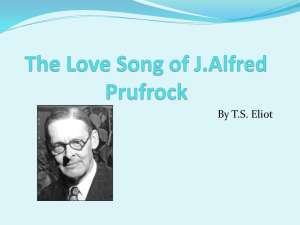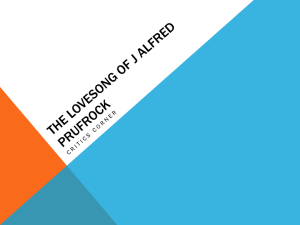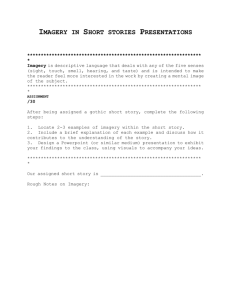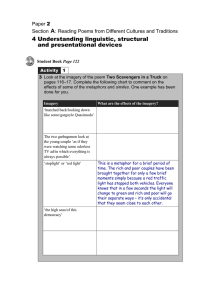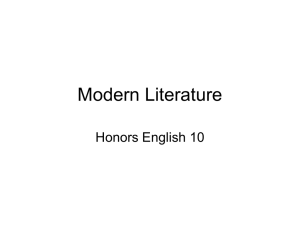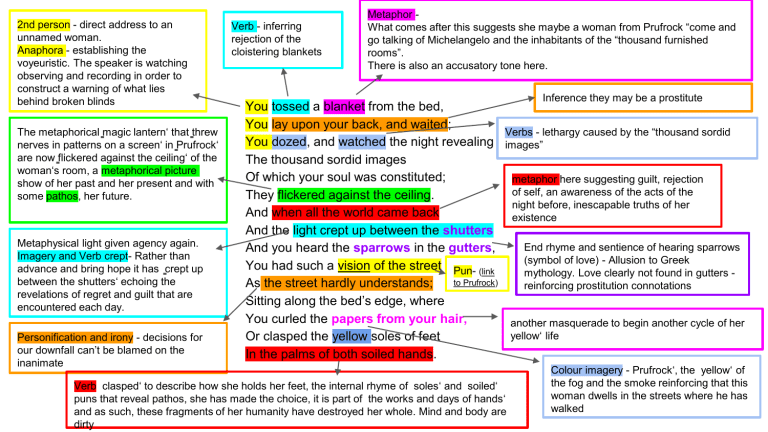
2nd person - direct address to an unnamed woman. Anaphora - establishing the voyeuristic. The speaker is watching observing and recording in order to construct a warning of what lies behind broken blinds The metaphorical ̳magic lantern‘ that ̳threw nerves in patterns on a screen‘ in ̳Prufrock‘ are now ̳flickered against the ceiling‘ of the woman‘s room, a metaphorical picture show of her past and her present and with some pathos, her future. Metaphysical light given agency again. Imagery and Verb crept- Rather than advance and bring hope it has ̳crept up between the shutters‘ echoing the revelations of regret and guilt that are encountered each day. Personification and irony - decisions for our downfall can’t be blamed on the inanimate Verb - inferring rejection of the cloistering blankets Metaphor What comes after this suggests she maybe a woman from Prufrock “come and go talking of Michelangelo and the inhabitants of the “thousand furnished rooms”. There is also an accusatory tone here. You tossed a blanket from the bed, You lay upon your back, and waited; You dozed, and watched the night revealing The thousand sordid images Of which your soul was constituted; They flickered against the ceiling. And when all the world came back And the light crept up between the shutters And you heard the sparrows in the gutters, You had such a vision of the street Pun- (link to Prufrock) As the street hardly understands; Sitting along the bed’s edge, where You curled the papers from your hair, Or clasped the yellow soles of feet In the palms of both soiled hands. Inference they may be a prostitute Verbs - lethargy caused by the “thousand sordid images” Verb clasped‘ to describe how she holds her feet, the internal rhyme of soles‘ and soiled‘ puns that reveal pathos, she has made the choice, it is part of the works and days of hands‘ and as such, these fragments of her humanity have destroyed her whole. Mind and body are dirty metaphor here suggesting guilt, rejection of self, an awareness of the acts of the night before, inescapable truths of her existence End rhyme and sentience of hearing sparrows (symbol of love) - Allusion to Greek mythology. Love clearly not found in gutters reinforcing prostitution connotations another masquerade to begin another cycle of her yellow‘ life Colour imagery - Prufrock‘, the yellow‘ of the fog and the smoke reinforcing that this woman dwells in the streets where he has walked Poem IV Fragmented -> going through the cycle Returns to evening setting - Modern life has continued on. The image of his soul stretched tight could be influenced by LaForgue The cycle is ending - the incessant feet of people heading home Street is corrupted - blackened by pollution and industrialisation, but also in abstract metaphorical way Left agricultural image for urban spaces This stanza has a lot of religious imagery and connotation in it Final prelude is in three parts 3rd person - shifts in direction, reference a masculine entity, perhaps God, perhaps man, perhaps Prufrock. Perhaps using the man as an expression of an idea Religious imagery verb stretched‘ and adverb tight‘ exposes tension heartbroken IV Light hiding away from humanity behind the dramas and demands of the city‘ a modernist metaphor for corruption and the derisive nature of human interaction His soul stretched tight across the skies That fade behind a city block, Or trampled by insistent feet Polysyndeton drags out these hours, reinforcing time watched, lived and wasted once again, the time trope linking to Prufrock‘ Repeating symbol - grime we cannot escape. His soul floats about, ignored Personification and Negative imagery - fading so no one bothers with it Conscience continues to come back and wants to join the world. (what stops it joining? Does life get in the way? At four and five and six o’clock; And short square fingers stuffing pipes, And evening newspapers, and eyes Assured of certain certainties, The conscience of a blackened street Metaphor Skies the one at the beginning of Prufrock Aggressive verb - being taken advantage of Imagery - parts not a whole/together Pipe - smoke imagery Listing of dismembered body parts Paradox reinforcing they are no wiser about their purpose or their outcome than Prufrock (absurdist). Monotony of the day (bills, day, night, work, hunger, pipe-smoking) unflatterying image Impatient to assume the world. End stop - pause to contemplate this Eliot is presenting a thoughtful exposé here on modernity. His male soul sees all but is incapable of being anything more than an observer himself, the city has dictated it thus. Fragmented images of the city being trampled by insistent feet‘ is entirely negative in connotation, the regime, the patterns of behaviour, the demands of the corrupting influences stamped by time Verb - almost like the feline imagery in Prufrock. All encompassing sense of dismay, like the metaphorical fog Shifting voices - first person now, a reflective voice, and then second person next stanza I am moved by fancies that are curled Around these images, and cling: The notion of some infinitely gentle Imperative - for their are weaknesses, limitations and sorrows and there always will be. Repetition of infinitely (adverb) - reminds us of the intangibility of resolving such conundrums. They existed at the beginning of time and will continue to into the next generation. Infinitely suffering thing. Wipe your hand across your mouth, and laugh; 2nd person and verbs - collectively laughter is the only resolve The worlds revolve like ancient women Verb revolve‘ to emphasise that his observations links past, present and future Simile - reminds of mythology - both endurance and isolation. world continues on, history repeats itself. TIme has no meaning as we continue to do the same things Gathering fuel in vacant lots. Image links to previous one. There is a sense of desperation in these final lines, images of a dystopian future.The vacant lots‘ are the emotional wastelands we are left with when the wars of human interaction have long since destroyed the cities we have built and isolated ourselves within. The preludes, musical introductions, are paradoxical; these introductions to the symphonies of human existence are disturbing, discordant. The shifting perspectives across the poem do not allow a synthetic whole and yet, cleverly allow glimpses into why we exist within our environment with such disharmony. The work is ephemeral in one sense, fragments of moments in time that are paradoxically interminable reminders of our inability to resolve the fractured inequities of human experience.
